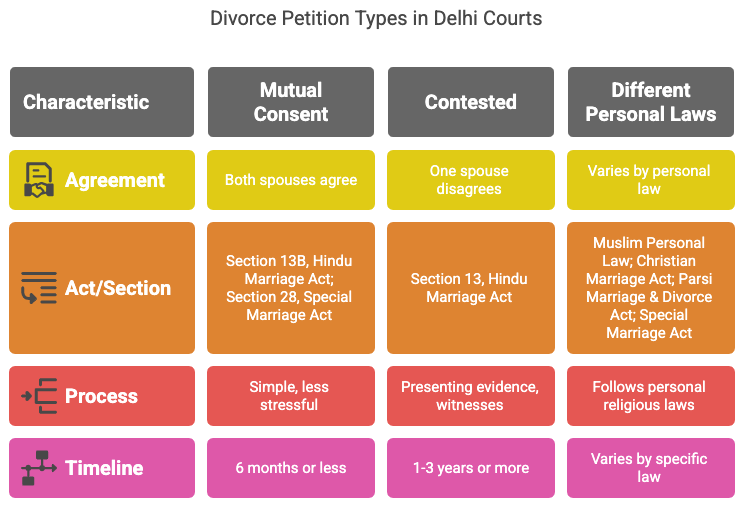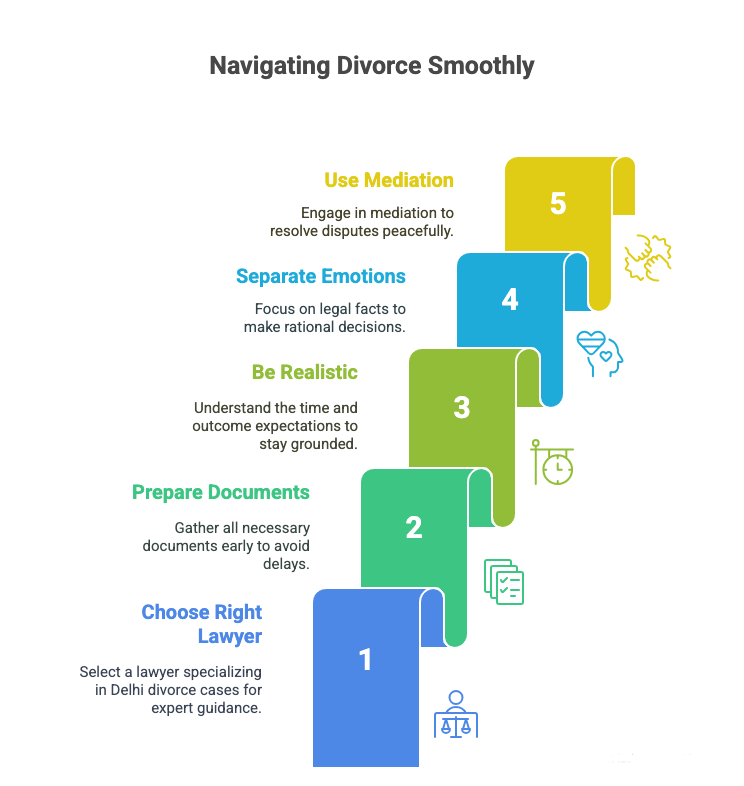Understanding the Role of Mediation in Delhi Divorce Cases
What Is Divorce Mediation?
Divorce mediation is a way for couples to work out their issues without going to court. They meet with a neutral third person, called a mediator. This person helps them find solutions they both agree on.
The mediator doesn’t decide for them. Instead, they help both sides talk and understand each other better. This way, couples can make their own decisions about things like custody and money.
Mediation is different from court because it lets couples:
Talk openly without fear of judgment
Make their own choices about important issues
Find solutions that cost less emotionally and financially
In Delhi, mediation can happen in two ways:
Privately, if both agree beforehand
At court-referred centres like Saket or Tis Hazari
Mediation is a good way to reduce conflict. It’s often the first step judges suggest before going to trial.
When Is Mediation Required in Delhi Family Courts?

In Delhi, mediation is often a required first step in divorce cases. This is because Indian law and court policies encourage peaceful settlements. Judges try to help couples find amicable solutions before going to court.
Legal Basis for Mediation
The Family Courts Act of 1984 supports reconciliation before disputes are decided. So, Delhi family courts often send couples to mediation. This is true for:
Disagreements over alimony, custody, or property
Maintenance disputes
Petitions under Section 9 (restitution of conjugal rights)
When Do Courts Recommend Mediation?
Mediation is usually ordered by the judge:
At the first or second hearing, after both parties have appeared
When an out-of-court resolution seems possible
If emotions might settle with dialogue
You might get a formal referral to a mediation centre. This depends on where your case is filed.
Is Mediation Mandatory?
While not mandatory in every case, courts strongly encourage it. Refusing mediation without a good reason can look bad later. But, mediation isn’t pushed if there’s domestic violence or abuse involved.
Can I Request Mediation Voluntarily?
Yes. Couples can choose mediation before filing for divorce. They can:
Go for private mediation with a certified mediator
Ask their lawyer to suggest a neutral mediator
Request court-referred mediation if their case is ongoing
Many couples have found quick solutions through mediation, faster than in court.
Benefits of Mediation Over Litigation
When emotions are high and communication breaks down, court might seem like the only choice. But mediation is often a less stressful and more effective way. It’s gaining popularity in Delhi family courts for good reasons.
1. Confidentiality
Court cases are public. Mediation is private. This means everything discussed stays confidential, which is key in sensitive cases.
2. Faster Resolutions
Litigation can take years. Mediation can lead to agreements in just a few sessions. This saves time, emotional strain, and legal costs.
3. More Control Over Outcomes
In court, a judge decides. In mediation, you do. You have control over property division, custody, and financial support.
4. Less Emotional Damage
Divorce is tough. Mediation helps keep respect, which is vital for co-parenting. It sets a positive tone for the future.
5. Cost-Effective
Legal fees and documentation add up in court. Mediation cuts these costs by reducing court time and hearings.

Mediation Process in Delhi Family Courts
Mediation in Delhi is structured but flexible. Here’s what happens when a court refers your case:
1. Court Referral
After your first court hearing, the judge might send your case to mediation. You’ll get a formal order and a date for mediation.
2. First Mediation Session
Both spouses meet with a mediator in a neutral space. Each gets to share their concerns and priorities. The goal is clarity, not confrontation.
3. Multiple Sessions (If Needed)
If your case is complex, you might need more sessions. These are focused on finding solutions, not judging.
4. Settlement Agreement
If you reach an agreement, the mediator writes it up. This document is then given to the family court for approval.
5. What If Mediation Fails?
If no agreement is reached, your case goes back to court. Mediation efforts are noted, but nothing said can be used as evidence.
What Can Be Settled in Divorce Mediation?
Mediation can handle almost all divorce issues:
Child Custody and Visitation
Agreements can be made about who the child will live with, visitation schedules, and shared responsibilities.Maintenance and Alimony
Spouses can decide on monthly support, lump-sum payments, or waive maintenance based on mutual consent.Division of Property and Assets
Ownership, division, and use of marital property, bank accounts, investments, and other joint assets.Withdrawal of Other Cases
Criminal complaints under Section 498A, domestic violence, or maintenance claims can often be withdrawn as part of a settlement package.
When Mediation May Not Work
Mediation isn’t right for every case. It may not work in situations like:
Domestic violence or coercive control
One spouse refusing to participate honestly
Significant power imbalance or fear of intimidation
Lack of trust or complete breakdown in communication
In these cases, going to court is safer and more fitting. A lawyer’s role becomes even more critical.
Why a Lawyer’s Guidance Matters During Mediation
Mediation aims to reduce conflict, but you shouldn’t go in unprepared. A lawyer can help you:
Understand your legal rights before the first session
Review the proposed settlement to make sure it’s fair and enforceable
Spot red flags that could affect your future (e.g., vague child custody terms or unclear maintenance amounts)
A qualified divorce lawyer can also attend mediation sessions with you or be available for consultation outside the room to ensure your voice is properly represented.
Remember: A peaceful divorce is not just about ending a marriage — it’s about starting a new chapter on strong legal and emotional footing.
Frequently Asked Questions (FAQs)
1. Is mediation mandatory in all divorce cases in Delhi?
Not always. But family courts strongly recommend it, even in contested cases. Courts can legally send couples for mediation before a full trial.
2. What if my spouse refuses mediation?
If your spouse doesn’t show up or refuses to cooperate, the court might move forward with trial. Mediation only works if both parties are willing to participate.
3. Can I request mediation myself?
Yes. You or your lawyer can ask for mediation at any time. Many couples mediate privately before filing a formal petition.
4. How long does mediation take?
It varies. Simple issues might be solved in one session, while complex ones could need 2–5 sessions. It depends on the case.
5. Is the settlement legally binding?
Yes. Once both parties sign the settlement and it’s given to the court, the judge can make a decree. This decree is as enforceable as any court judgment.
Conclusion
Mediation is a path many divorcing couples don’t know they have. It offers a chance to separate with dignity, privacy, and control. In a fast-paced city like Delhi, it can avoid years of court battles.
Whether you’re exploring divorce, already in the process, or want to resolve disputes quietly, I can help. I’ll guide you through the Delhi court mediation process and protect your rights.
Need help with divorce mediation or legal representation in Delhi?
Contact me today for a consultation.





